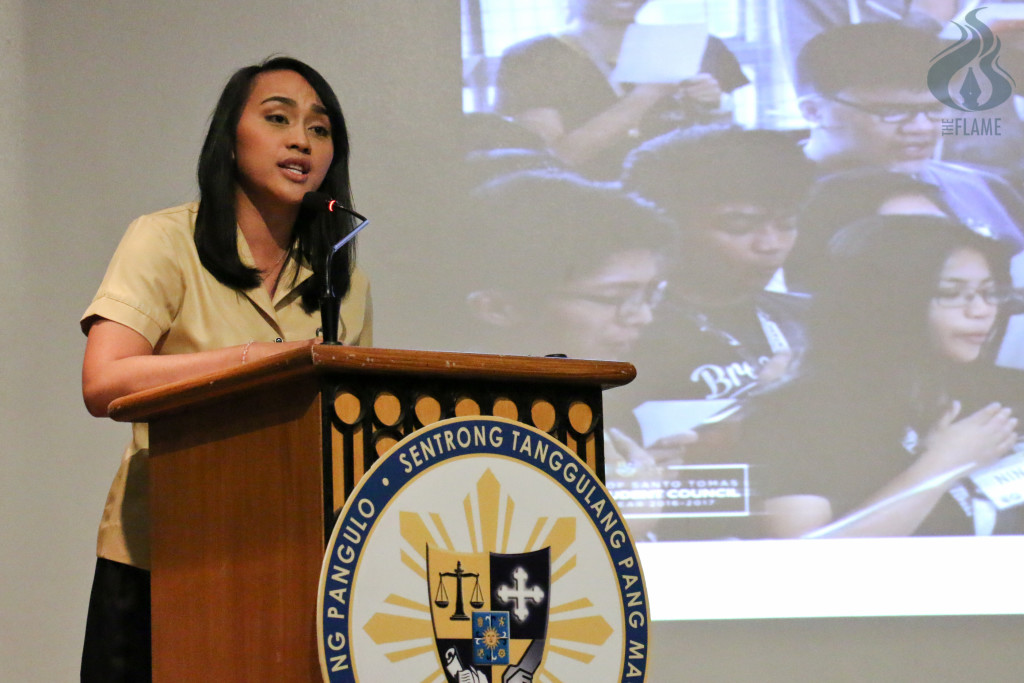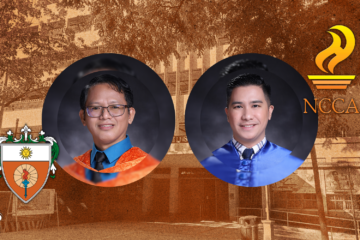
A COUNCIL that upholds competence, commitment, and compassion is the council that the Central Student Council (CSC) is aiming to build, CSC President Janela Love Nartates told Thomasians in her State of the Council Address (SOCA) held Feb. 11.
“We are the council which strives for an inclusive society [that] will embrace all genders and all beliefs. We are the council which will genuinely address the concerns of every student and […] the council which will portray a more responsible student leadership,” Nartates said.
She encouraged Thomasians to seek CSC and their respective local student councils for their grievances and concerns.
“Ipinapangako po namin at ipinapangako ko po, basta nasa tama at estudyante ka ng UST, ipaglalaban kita kapalit man ng posisyon ko,” she said.
Moreover, the CSC makes sure that as a “socio-political” institution, its projects are “relevantly” representing different national issues, Nartates said.
“We are not event organizers […] We want to show other universities that besides having a good quality of education, we also offer meaningful and fun activities,” she said.
Students’ Code
The Students’ Code—which states the rights and responsibilities of students in line with the rules and regulations of the University—is still in the hands of CSC and the Central Board as it has to be updated and revised due to some provisions that are already practiced in the University.
“Nasa amin na ulit ng Central Board [‘yung Students’ Code] para i-finalize lahat ng details […] para po kapag nai-present namin at nailatag namin sa students ay tayo ay makaka-relate,” Nartates told the Flame.
“Dati […] ‘yung mga tenured (professors), na-e-evaluate lang sila ng students every two years lang. Pero marami tayong nirereklamo about it na bakit ganun? Ngayon, as you can see, every year na-pa-practice na natin siya,” she added.
The Students’ Code, which was proposed in 2004, includes students’ rights to information, policy making, organization, academic rights, due process, and freedom of expression.
Marcos forgiven
Nartates also noted that the CSC has forgiven the Marcoses but still stands firm against the atrocities during the Martial Law period and the burial of the late president Ferdinand Marcos at the Libingan ng mga Bayani (LNMB).
“There’s a big difference between forgiving and forgetting […] We will never forget the atrocities during the martial law period wherein blood was shed because of the oppression and injustice during that era,” the CSC president said.
CSC did not participate in the rallies against the shock burial of Marcos at LNMB, but instead held a candle lighting ceremony inside the University.
Response to criticisms
Nartates also defended the council from criticisms regarding the leadership of its officers.
“To all who criticized the council, we respect you and we cherish you, because we take your criticisms, comments, and grievances, as a challenge for us to serve better,” she said.
The CSC has been criticized for its “inefficiency” when the issue of the alleged victim-blaming of a College of Fine Arts and Design student surfaced. The council was also accused of plagiarizing its statement regarding the issue from The Political Science Forum.
Among the accomplished projects of the CSC for the past six months were Tiger Oasis, Diamonds, Veritas, Humans of UST, Thomasian Welcome Party, Tiger Info, Sinag Youth Camp, Scrap at Libro Para sa Kinabukasan Ito, Kumusta Tomasino?, and Tiger Agenda. F VANN MARLO M. VILLEGAS



